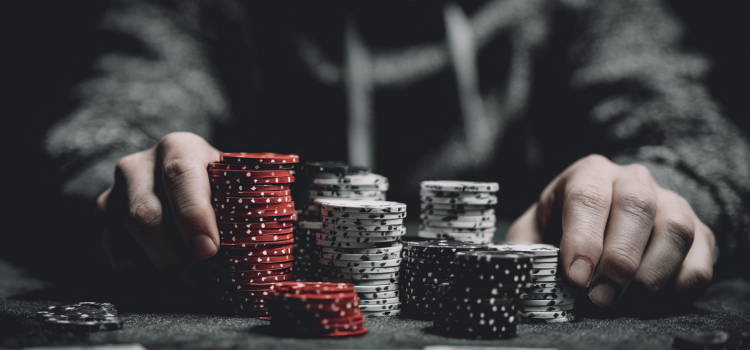
What is the relationship between skill and chance in life? What can we control, and what must we leave up to luck?
In a world obsessed with certainty, Maria Konnikova’s book The Biggest Bluff reveals how poker—with its blend of skill and chance—teaches invaluable lessons about decision-making in uncertain conditions. A psychologist turned professional poker player, Konnikova demonstrates that while we can’t control life’s outcomes, we can master the decisions we make.
Read more in our overview of The Biggest Bluff.
Overview of The Biggest Bluff by Maria Konnikova
In her book The Biggest Bluff (2020), Maria Konnikova argues that though chance is a fact of life we can’t outrun, skill can take us far. Through the lens of poker, she explores how becoming skilled means learning to make better decisions. In turn, making better decisions requires learning the game (whether it’s cards, business, or romance) on both a technical and psychological level.
Konnikova is an award-winning journalist for The New Yorker and holds a PhD in psychology from Columbia University. Her first two books explored critical thinking (Mastermind) and the charisma of con men (The Confidence Game) from the perspectives of psychology and cognitive science. Konnikova is well-known for becoming a professional poker player while researching The Biggest Bluff.
Life Is a Game of Skill and Chance
Life isn’t literally a game—but viewing it as one clarifies and teaches us about the relationship between skill and chance, according to Konnikova. This section explores what kind of game we should view life as (one where you can’t know or control everything) and why poker excels at teaching us to play it better. After introducing these ideas, we’ll define skill and chance, explain their relationship, and explain how understanding them can help you succeed in any area of life.
You Can’t Account for Everything
Every day, we make decisions without having all the information that might help. Whether you’re deciding on a career move, choosing a life partner, or making an investment, you’re acting with partial knowledge at best. What will the job market look like in five years? Is this person truly compatible with you? Will this investment pay off?
According to Konnikova, these are games of imperfect information: You can’t know everything that might help you make decisions, and most of the variables are out of your control. You have to make the best decisions you can with the information available to you and with limited power. Most of life is like this. For instance, a startup founder uses what data he has and his decision-making skills to determine whether there’s a market for his big idea. But even with a seemingly promising product idea, the company could still fail.
Games of imperfect information involve both skill and chance. You can learn to be good at the game, but you’ll always be somewhat at the mercy of randomness. From this recognition, Konnikova asks her central question: To what extent can we control outcomes in life, and to what extent do things come down to luck?
How Poker Teaches Us About Life
Some games (like Go or checkers) are games of perfect information. You can learn optimal ways to play them, so the more skilled player typically wins. Konnikova says these games aren’t useful for learning about life; they depend too heavily on skill. Pure gambling, as in blackjack or slots, doesn’t help either, because it depends too heavily on chance.
Casting aside games of perfect information as well as gambling, Konnikova writes that poker is the best game for learning about skill and chance in life. Like life, it’s a game of imperfect information in which both factors play large roles. Also, if you want to get anywhere in either, you have to distinguish between what you can control (skill) and what you can’t (chance).
Poker teaches this by forcing you to acknowledge both elements. In poker, you can learn the probabilities of a deck of cards and play every hand you’re dealt as best as possible. You control your own decisions, but you can’t know or control the other players, nor the next cards to be dealt. Skill determines your success in the long run, but chance can dramatically impact any given hand. Neither skill nor luck is enough on its own: Given two players of comparable skill, the luckier one may triumph, but either could outplay the other (much as in life).
Konnikova explains that poker doesn’t just force you to understand how skill and chance interact—it also teaches these lessons swiftly. In life, it’s often difficult to determine whether you’ve made a good choice. There’s no clear feedback, and there’s plenty of noise in which to lose the signal. But at the card table, you get immediate, unambiguous feedback on every decision you make. Your choices have tangible consequences: chips won or lost, money gained or given. While a poor business decision might take years to reveal its consequences, a bad call at the poker table hits your wallet right then and there.
Recognize What You Can and Can’t Control
Konnikova says that because poker teaches you about skill and chance in a swift, merciless way, it’s an ideal way to learn about life. That is, it teaches you how to distinguish between what’s in your control and what isn’t—and this basic lesson extends to all areas of life.
For example, in business, you can’t control whether a startup succeeds, but you can control the rigor of your market research and product idea validation. In relationships, you can’t guarantee connection and care, but you can choose to communicate honestly and clearly. In stock trading, you can’t control how the markets fluctuate, but you can maintain composure and learn from every mistake you make.
By distinguishing between what you can and can’t influence, you empower yourself to channel your energy productively, according to Konnikova. This gives you a leg up on everyone who wastes time on the impossible task of trying to control chance. So what can we control, and what can’t we? We’ll explain in the next section.
What We Can’t Control
So far, we’ve explained how life is a game of imperfect information that relies on both chance and skill, and how poker is an ideal way to learn about it. But what’s so hard to grasp about chance—you win some, you lose some, right?
Not quite. According to Konnikova, we humans struggle to grasp randomness and uncertainty, and this can lead to futile, misguided attempts to control outcomes. We’ll explain in this section why probability is counterintuitive, how to accept the reality of randomness, and how to avoid falling prey to magical thinking about chance.
We Can’t Control Outcomes
Most of us like to think we’re generally in control of our lives, but this is an illusion. Everything is subject to randomness, so we can’t control the outcomes of our choices. In poker, even a mathematically perfect decision can lead to failure, while comparatively poor choices sometimes work out. Life is like this, too—sometimes you can’t seem to catch a break no matter how hard you work, but sometimes you strike gold.
Why do we struggle to understand this? Konnikova says it’s because our brains aren’t wired to handle probabilities. We evolved to learn from our experiences and recognize patterns, like associating the rustle of leaves with the likelihood that a predator is near. Because of this, we make decisions based on gut feelings, and we assume that the small sample size of our experiences reflects the larger distribution of possibilities.
Historically, relying on gut feelings kept us alive. But today, it often leads us astray when we’re dealing with randomness and probabilities. This is because while our brains are great at recognizing tangible patterns, like the colors and shapes of edible versus poisonous fruit, they’re terrible at grasping abstract statistical patterns, like the distribution of cards in a deck. We also struggle with percentages—people tend to interpret an 85% likelihood to mean that an outcome is certain, but Konnikova writes that 15% chances happen more often than we intuit.
Because of these inherent shortcomings in our thinking, Konnikova explains that we have to consciously work to understand probabilities and randomness. Poker teaches us to accept the randomness of outcomes through “bad beats”—hands where you make the mathematically correct decision but lose anyway. Bad beats teach that you can do everything right and still fail because the variance of the deck just wasn’t in your favor, and variance is out of your control.
Rationally Accept Randomness
Rather than thinking we’re in control, Konnikova argues we must learn to accept the variance of chance. She references the Chinese parable in which a farmer who, going through many seemingly good and bad events one after another, refuses to label them as fortunate or unfortunate. He recognizes that he can’t truly know how events fit into the grand scheme of things, so it’s no use getting hung up on his constantly changing fortunes. In other words, chance events aren’t inherently good or bad—those are meanings that we affix to them.
To put this insight into action, choose to be dispassionate about randomness. When variance lifts you up or strikes you down, recognize it as the randomness it is and let go of your elation or deflation. This way, you can learn from every outcome (we’ll explain how in the next section) rather than giving away more control than necessary to stories of “good” or “bad” luck.
That last way of thinking, Konnikova says, is a dangerous mistake. Superstition plays no role in a successful approach to poker or life. In gambling, many players try to gain a sense of control by using “lucky” rituals or talismans, like a special way of riffling chips or a lucky pair of underwear. This is foolish and futile: Superstitions can’t change outcomes or ward off random variance. Further, relying on them gives away your agency—instead of choosing to be rational and learn more, you lean on an intellectual and emotional crutch.
Don’t deny the power of chance, but don’t let superstition paralyze you, either. Acknowledge that outcomes are out of your control, stay calm and balanced regardless of what happens, and focus on making the best decisions you can in an inevitably uncertain world. This is as effective for life as it is for poker, according to Konnikova.
What We Can Control
So far, we’ve explored how life resembles a game of imperfect information, how poker teaches us about skill and chance, and why we must accept rather than fight against randomness. But if we can’t control outcomes, what can we control? According to Konnikova, you control the decisions you make. In effect, how skilled you are at something (like poker or tennis) comes down to the quality of your decision-making in that domain.
In this section, we’ll explore how to learn to make better decisions by mastering both the technical and psychological aspects of any game (we’ll call these the outer game and inner game for short).
We Control Our Decision-Making
Konnikova writes that though we can’t determine outcomes, we can still learn to make the best decisions possible. In poker, every hand involves multiple decision points, like whether to play or fold, how much to bet, and which opponents to target. The cards you get aren’t up to you, but how you play them is. This goes for life, too.
Konnikova says that to get better at poker or anything else, focus on the overarching process of learning rather than the outcomes of each individual choice. The outcomes will always vary, but you can still learn from every choice you make. Over time, this will teach you to make better decisions—thereby getting more skillful—in any situation.
Improve Your Decision-Making Skills
If we become skillful by learning to make better decisions, how do we do this in practice? Konnikova explains: To improve your decisions, you need to develop your technical knowledge as well as your psychological knowledge. By mastering both the outer, technical dimension of a skill and its inner, psychological dimension, you develop true skill—the ability to make excellent decisions consistently. While chance will always play a role in outcomes, this two-part approach to skill development will help you maximize your success in the face of randomness.
Master the Outer Game
Your outer game is your grasp of how things work on a technical level. It involves explicit knowledge of the rules and dynamics of the game. In poker, that means knowing how to form good hands, the probabilities of winning with a given set of cards, how to bet properly, and so on. In a domain like photography, technical skill means knowing how cameras work and how to use yours mechanically (which is distinct from knowing how to take artful, creative photos).
Konnikova writes that to build technical skill, you need to get a lot of practice through direct experience and regularly reflect on what you’re learning. If you’re starting from scratch, read a beginner’s book or two, and then jump right in—hands-on experience will teach you more in the long run.
To learn poker, Konnikova played hundreds of hands (noting key decisions as she made them) and then reviewed her play at the end of each day. During this post-mortem, she reflected on what she did, what she might’ve done better, and what she’d do next time. Over time, she learned to recognize the proper technical decisions to make in different situations, like when to fold with a weak hand or whether to push her luck with a strong one.
You can apply this approach to other areas of life. If you’re in business, you might develop your technical skill by systematically reflecting on the decisions you make in guiding your team or company. When you look back on the decisions you made, perhaps on a quarterly basis, find patterns or errors that stick out to you. Reflect on how those decisions played out and what you could’ve done better, then apply whatever lessons you find the next time around.
Master the Inner Game
Technical knowledge forms the foundation of skill, but Konnikova says that you also need to develop your knowledge of a skill’s psychological dimension (your inner game). This means learning to make better decisions related to your inner state and to interpersonal dynamics. For instance, psychological skill in poker involves knowing yourself—your own emotional patterns around things like betting and bluffing—and knowing how to manage your state in the chaotic social environment of the poker table.
Why does this matter? According to Konnikova, it matters because even when you have the right technical knowledge (you know the optimal choices to make), psychological barriers can still cause you to make bad decisions. In poker, this might look like losing your cool and wasting a strong hand with an overly aggressive raise. In business, you might get impatient during tense negotiations and flub the deal. It’s not enough to know the right choice to make: You must also make it consistently while under pressure.
You can master your inner game with the same trial-and-error learning approach we described earlier. Konnikova discusses applying it to a few key areas of psychological skill: developing self-knowledge, staying present, and managing “tilt.”
Develop self-knowledge: Explore and identify the emotional patterns you experience when you need to make tough decisions. What emotions do stress and pressure tend to trigger in you? List these out, then practice recognizing and defusing them when they arise. Konnikova suggests planning what you’ll do ahead of time, such as practicing mindful breathing when you get triggered, and then using those pre-crafted responses in the moment.
Stay present: In poker, you need to make good decisions amidst constant distraction—smoke, chatter, banter, loud personalities, and more. Konnikova learned early on that managing her attention was key to following the game and, thereby, to making good decisions. This works outside of poker, too: A present, focused state of mind helps you pick up on important details and navigate challenges. To get better at presence, practice focusing your attention to filter out noise and tune into what’s important. For instance, Konnikova would ignore banter and drinks and all the many distractions in casinos to focus exclusively on the game at hand.
Manage “tilt:” Tilt is a poker term for losing your cool due to emotion. It can be positive or negative, due to excitement or frustration. Both kinds throw you off by causing you to behave less rationally. Learn to recognize when you’re tilted and take time to reset, such as by taking a walk (Konnikova did this during breaks in play at tournaments) or washing your face.






